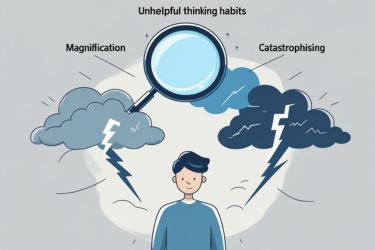Unhelpful thinking habits can sneak into our daily lives, often causing stress and self-doubt. One of the most common patterns we encounter is the use of "should" and "must." These phrases create unrealistic expectations that can lead to feelings of guilt and inadequacy. By recognising these thought patterns, we can begin to address the negative impact they have on our mental well-being.

When we consistently tell ourselves what we "should" or "must" do, we set ourselves up for failure. This can result in a cycle of disappointment and anxiety. It’s essential to understand how these thoughts affect our behaviour and feelings, allowing us to make meaningful changes to our mindset.
As we explore unhelpful thinking habits, we will discover practical strategies to replace "should" and "must" with more flexible and supportive thoughts. The goal is to encourage a healthier way of thinking that promotes self-acceptance and reduces pressure.
Key Takeaways
- Recognising "should" and "must" can help identify unhelpful thinking patterns.
- Shifting our mindset leads to healthier thought processes.
- Adopting supportive language improves our mental well-being.
Understanding Unhelpful Thinking Habits: Should and Must

We often find ourselves trapped in a cycle of “should” and “must” thinking. These statements can lead to feelings of pressure and disappointment. Recognising these patterns is the first step towards breaking free from their negative influence.
Defining 'Should' and 'Must' Thinking
“Should” and “must” statements are forms of imperative thinking. They create rigid expectations about ourselves and others. For instance, saying “I should exercise more” implies an obligation. This can lead to guilt when we don’t meet these expectations. Similarly, “I must finish my work by 5 PM” creates stress and anxiety when circumstances change.
This kind of thinking can distort our reality. It ignores our feelings and circumstances, often leading to automatic negative thoughts. These thoughts can spiral, affecting our mood and motivation.
Origins of Imperative Thinking
Imperative thinking often stems from various sources. Many of us absorb these beliefs from family, culture, or society. We learn that there are specific ways we "should" behave to be acceptable.
This internalisation can lead to unhelpful thought patterns. As children, if we hear phrases like “You must do well in school,” we carry these expectations into adulthood. These statements often become cognitive distortions, making it hard to adapt when life doesn’t go as planned.
How 'Should' and 'Must' Statements Influence Thoughts
“Should” and “must” statements can impact our mental health significantly. They tend to create a sense of failure when we cannot meet these expectations. For example, when we think, “I should be happy all the time,” we ignore our real emotions.
These thoughts can also lead to self-criticism. When we fail to meet our own high standards, we might start to believe we are not good enough. It can result in increased stress and feelings of inadequacy.
Recognising these distortions in our thinking allows us to challenge them. By replacing “should” and “must” with more flexible language, we can create a more compassionate inner dialogue. This shift can help reduce anxiety and improve our overall mood.
Psychological Impact of 'Should' and 'Must' Thinking

The way we think can greatly influence our emotions and mental health. When we frequently use "should" and "must" in our thoughts, it can lead to a number of negative outcomes, affecting our feelings and self-esteem. Let's explore these impacts in detail.
Effects on Emotions and Feelings
Using "should" and "must" creates expectations that can lead to frustration and disappointment. These statements can cause us to feel guilty when we don't meet our own high standards. For example, we might think, "I should have completed that project by now." When we fall short, we often experience feelings of shame or regret.
This emotional burden can weigh heavily on our day-to-day lives. We might notice increased irritability or sadness as we dwell on our perceived failures. Thus, these rigid thoughts can limit our emotional flexibility, making it difficult for us to cope with challenges.
Links to Anxiety and Depression
The pressure from "should" and "must" thinking can significantly contribute to anxiety and depression. When we constantly believe we must meet certain criteria, it can create a cycle of worry. We may constantly feel anxious about failing to meet expectations, which can worsen mental health.
Research shows that individuals who engage in such thinking patterns are more likely to experience symptoms of anxiety and depression. It is crucial for us to recognise these links, as they can serve as warning signs for our mental well-being. By acknowledging this connection, we can work towards healthier thinking patterns.
The Role in Low Self-Esteem
"Should" and "must" thinking often correlates with low self-esteem. When we set high expectations that we cannot achieve, it leads to negative self-talk. We might tell ourselves, "I should be better" or "I must not fail," which undermines our self-worth.
This constant criticism can lead to a diminished view of ourselves. We may start to believe we are not capable or deserving of success and happiness. Over time, this can create a cycle of low self-esteem and further negative automatic thoughts, making it harder for us to break free.
Recognising and reframing these thought patterns can help us rebuild our confidence and improve our mental health.
Common Cognitive Distortions Associated With 'Should' and 'Must'

When we use "should" and "must," we often engage in cognitive distortions that affect our thoughts and emotions. Understanding these patterns can help us recognise and address them more effectively.
All-or-Nothing Thinking
All-or-nothing thinking refers to viewing situations in black and white terms. We might believe that if we do not meet our own standards or expectations, we have failed entirely. For instance, saying, "I should always be productive" leads to experiences of guilt when we rest or take breaks. This rigid thinking prevents us from recognising the nuances in our lives and often results in unnecessary stress. When things do not go perfectly, it's easy to fall into a negative mindset.
Overgeneralisation
Overgeneralisation occurs when we make broad conclusions based on specific events. If we think, "I must not make mistakes," we may view any error as a personal failure. This distorted belief can skew our perspective, causing us to feel inadequate and anxious about future tasks. These thoughts limit our ability to see the bigger picture and often lead to a negative mental filter. We might miss out on our achievements, focusing only on what went wrong instead of what we learned.
Labelling and Catastrophising
Labelling involves assigning negative traits to ourselves based on our actions. For example, if we feel anxious before a presentation, we might label ourselves as "a failure." Catastrophising takes this a step further by imagining the worst possible outcome of a situation. If we think, "If I don't succeed, I will let everyone down," we instantly amplify our fear and anxiety. This type of thinking traps us in a cycle of self-doubt, making it hard to move forward. Recognising and challenging these labels can help us foster a more balanced view of ourselves and our abilities.
Consequences and Maintenance of Unhelpful Thinking Styles

Unhelpful thinking styles can have serious consequences for our mental health. They lead to stress, emotional reasoning, and a tendency to take on undue responsibility. Additionally, these patterns can result in discounting positive experiences, which further deepens our negative outlook.
Stress and Emotional Reasoning
When we engage in unhelpful thinking, stress often follows closely behind. We might tell ourselves we “should” be perfect or that we “must” meet every expectation. This creates immense pressure. As a result, we might feel overwhelmed and anxious.
Emotional reasoning also plays a significant role here. We might believe our feelings reflect reality. For instance, just because we feel inadequate doesn’t mean we truly are. This distorted view can heighten our stress levels as we continue to react based on these flawed beliefs.
Responsibility and Blame
We often take more responsibility for situations than we should. Unhelpful thinking might lead us to believe we are at fault for things outside our control. This feeling can result in self-blame, which is damaging to our self-esteem and mental health.
Taking too much responsibility can prevent us from recognising when a situation is not our fault. It might lead to feelings of guilt or shame, further leading us to internalise these harmful beliefs. This cycle makes it hard for us to escape a negative mindset.
Discounting the Positive
Another consequence of unhelpful thinking is the tendency to discount the positives in our lives. When we focus on what we’re not doing well, we might overlook our achievements and good qualities. This habit reinforces negative thought patterns and diminishes our self-worth.
For example, if we receive compliments but think, “They’re just being nice,” we minimise our success. This thought pattern causes us to ignore any positive feedback and can lead to a more hopeless outlook. By consistently dismissing the positives, we further entrench ourselves in negativity, which affects our overall well-being.
Identifying and Challenging 'Should' and 'Must' Thinking
Understanding our negative thought patterns is the first step towards managing them. The phrases "should" and "must" can create unnecessary pressure and unrealistic expectations. By becoming more aware of these thoughts, we can start to change our interpretations of situations.
Awareness of Negative Thought Patterns
We need to recognise when we use "should" and "must" in our thinking. These phrases often reflect strict beliefs about how we or others ought to behave. For example, thinking “I should exercise” can lead to feelings of guilt when we don’t.
Identifying these thoughts is crucial in cognitive behavioural therapy (CBT). CBT helps us examine automatic thoughts and their impact on our feelings. Aaron Beck, a leader in this area, emphasised the importance of spotting negative automatic thoughts.
By becoming aware, we create space to challenge these beliefs. We can ask ourselves questions such as, "Is this thought realistic?" or "What would I say to a friend in this situation?" This approach fosters healthier thinking patterns, allowing us to interpret the world in a more balanced way.
Techniques for Reframing Thoughts
Reframing our thinking involves changing how we interpret our thoughts. One technique is to replace "should" and "must" with more flexible language. For example, instead of saying “I must finish this project,” we can say, “I would like to finish this project.”
This simple change reduces pressure and encourages a more positive mindset. We can also use evidence to assess our thoughts. Listing the facts can help us distinguish between reality and unhelpful thinking styles.
Journaling can be another effective tool. Writing down our "should" and "must" statements allows us to analyse them more clearly. We can then challenge these thoughts and replace them with more supportive ideas.
By implementing these techniques, we can start to break free from the constraints of "should" and "must." This shift leads to greater emotional balance and improved mental wellbeing.
Tools and Strategies for Healthier Thinking
We can adopt various tools and strategies to shift towards healthier thinking. These approaches help us recognise and change unhelpful thought patterns, leading to improved mental health and well-being.
Practical CBT Exercises
Cognitive behavioural therapy (CBT) offers practical exercises to challenge unhelpful thinking habits like "should" and "must." One effective exercise is thought records. We can write down our negative thoughts, identify the emotions connected to them, and then challenge their validity.
Another useful tool is cognitive restructuring. This involves taking a negative thought, finding evidence against it, and replacing it with a balanced thought. For instance, if we feel, "I must always succeed," we can reframe it to, "I can learn from my mistakes."
Using these exercises regularly can help us develop healthier thinking styles and reduce anxiety.
Long-Term Mental Health Benefits
Engaging in these CBT strategies can lead to significant long-term mental health benefits. By consistently recognising and reframing our unhelpful thoughts, we build resilience against stress and anxiety.
Practising these exercises helps us develop a more balanced outlook. This change can improve our overall mood, relationships, and self-esteem.
Additionally, healthier thinking can lead to better decision-making and problem-solving skills. We start to approach challenges with a mindset focused on opportunities rather than limitations.
In time, these strategies not only enhance our mental well-being but also contribute to our emotional stability and overall quality of life.
Frequently Asked Questions
In this section, we will address common queries about unhelpful thinking habits involving 'should' and 'must' statements. These questions will help clarify how these phrases impact our mental health and how we can modify our thinking patterns.
What constitutes unhelpful thinking habits involving 'should' and 'must' statements?
Unhelpful thinking habits occur when we impose rigid expectations on ourselves. Statements like “I should always be successful” or “I must meet everyone’s needs” create undue pressure. Such beliefs often lead to feelings of guilt and inadequacy when we fall short.
How can one challenge and alter unhelpful thinking patterns that involve excessive 'should' and 'must' declarations?
To challenge these thoughts, we can start by identifying and questioning them. We ask ourselves if the beliefs are realistic or helpful. Replacing 'should' and 'must' with softer language, like “I would like to” or “It would be nice to”, can also shift our perspective and reduce pressure.
Can you provide examples where 'should' and 'must' are used in unhealthy thinking habits?
Examples include phrases like “I should get all A’s” or “I must never fail”. These thoughts create a fear of failure and can lead to stress. By recognising such statements, we can become aware of their impact on our well-being.
In what ways can 'should' and 'must' thoughts contribute to negative mental patterns?
Thoughts framed with 'should' and 'must' often lead to feelings of obligation. This can create anxiety, low self-esteem, and a sense of hopelessness. When we constantly feel we have to meet high demands, it can affect our happiness and motivation.
What strategies can be employed to break free from the cycle of negative thinking involving 'should' and 'must'?
We can use cognitive restructuring techniques to challenge these thoughts. Practising self-compassion is another key strategy. Focusing on our achievements and recognising our efforts, rather than our shortcomings, can help create a healthier mindset.
How do psychological tools assist in transforming unhelpful 'should' and 'must' thoughts?
Psychological tools such as cognitive behavioural therapy (CBT) are effective in addressing these issues. CBT helps us recognise and reframe negative thoughts. Additionally, mindfulness techniques can aid us in observing our thoughts without judgment, leading to more balanced thinking.




















